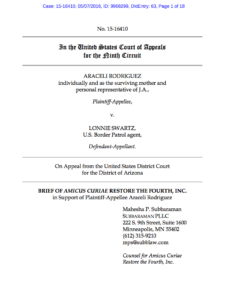 The Cyberlaw Clinic and attorney Mahesha Subbaraman of Subbaraman PLLC submitted an amicus brief to the United States Court of Appeals for the Ninth Circuit this week on behalf of civil liberties advocacy organization, Restore the Fourth, in the case, Rodriguez v. Swartz. As set out in more detail in the brief and summarized in a statement by Restore the Fourth, the case concerns the 2012 shooting of a Mexican teenager by United States Border Patrol agent Lonnie Swartz. The victim — 16-year-old Jose Antonio Elena Rodriguez — was in Nogales, Mexico; the agent fired shots from the U.S. side of the border, through a border fence, killing Rodriguez as he walked home following a basketball game.
The Cyberlaw Clinic and attorney Mahesha Subbaraman of Subbaraman PLLC submitted an amicus brief to the United States Court of Appeals for the Ninth Circuit this week on behalf of civil liberties advocacy organization, Restore the Fourth, in the case, Rodriguez v. Swartz. As set out in more detail in the brief and summarized in a statement by Restore the Fourth, the case concerns the 2012 shooting of a Mexican teenager by United States Border Patrol agent Lonnie Swartz. The victim — 16-year-old Jose Antonio Elena Rodriguez — was in Nogales, Mexico; the agent fired shots from the U.S. side of the border, through a border fence, killing Rodriguez as he walked home following a basketball game.
The civil suit brought by the victim’s mother against the agent raises questions about whether the agent can claim qualified immunity and, in turn, whether the killing is subject to the Fourth Amendment’s requirements regarding the reasonableness of searches and seizures. The case has potentially far-reaching implications regarding the scope and continuing viability of United States v. Verdugo-Urquidez, 494 U.S. 259 (1990) — in which the United States Supreme Court addressed the applicability of the Fourth Amendment to a search of a Mexican citizen’s home in Mexico — and more broadly about the extraterritorial reach of the Fourth Amendment’s protections.
The amicus brief specifically responds to an argument advanced by the government in the case, suggesting that “the Fourth Amendment imposes no limit on the exertion of U.S. authority against aliens who lack substantial voluntary connections to the United States—even individuals within just a few miles of the U.S. border.” Restore the Fourth argues to the contrary, that the government “misread[s]” Verdugo-Urquidez to support its position and that the plurality in that case “did not erase the Fourth Amendment’s core demand that all government searches and seizures be ‘reasonable’—even extraterritorial searches and seizures of aliens.”
Spring 2016 Harvard Law School Cyberlaw Clinic students Travis West, Steven Wilfong, and Katherine Kwong contributed significantly to the brief.
